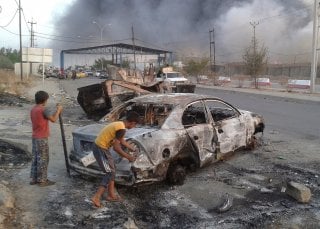Coronavirus Could Lead To Lots of This in the Near Future
How might this go down?
As the coronavirus pandemic monopolizes more of the world’s time, money and attention, the latest surge of violence in Kashmir between India and Pakistan highlights the potential for countries to act more aggressively with less scrutiny. But state actors aren't the only ones who will be tempted to capitalize on the current chaos. As more governments become bogged down by the virus and the economic fallout from containment efforts, jihadist groups and other non-state actors will also have the opportunity to advance their positions in security hotspots around the world. This could not only raise the risk for military escalations in those areas in the short term, but could allow militias to resurge once the global health crisis eventually subsides.
Attacks Amid the COVID-19 Panic
On March 18, Pakistan shelled positions along the Line of Control in Jammu and Kashmir, marking the fourth such attack by the Pakistani Army along the contested border region between Pakistan and India in as many days. While Kashmir is a perpetual security hotspot, this series of shellings marks a notable uptick in military activity in the area, and could highlight Pakistan’s willingness to be more risk-tolerant as both India and Pakistan (along with the rest of the world) deal with the growing effects of the coronavirus outbreak. This also raises the potential for a more aggressive Indian military response that risks triggering a military escalation, similar to the crisis in February 2019 that brought both nuclear-armed countries to the brink of war.
A Convenient Cover for Militants
The global coronavirus outbreak could also create opportunities for non-state actors, such as militant groups, to regroup and eventually resurge. A primary constraint on militant activity across various security hotspots has been constant pressure from security forces. But the diversion of resources and manpower from the frontlines of many of these fights toward containing the virus will ease pressure on these groups. Likewise, these groups face a lesser risk of being directly impacted by the virus, given that many of them operate in rural and isolated regions such as spacious deserts, rugged mountains and dense forests largely cut off from the outside world. These developments will afford these groups opportunities to regroup, reorganize and engage in more training, as well as plan new activity on both operational and strategic levels.
Examples of potential groups that could take advantage of these developments include, but are not limited to:
- Islamic State branches in Egypt, Iraq, Syria and Nigeria (also known as Boko Haram), among others
- Al Shabaab in Somalia and other al Qaeda branches around the globe
- The Maoist Naxalites in India
- Militant groups in Jammu and Kashmir
In the coming months or even years, long term economic impacts caused by the coronavirus crisis will weaken the governments' stances against these militant groups, potentially making the latter more dangerous. Governments will have fewer resources to allocate to security forces in the fight against these groups, especially in less developed countries that are already struggling to combat them. This may allow these groups to expand their areas of operations in light of decreasing pressure. In fact, economic downturn, scarce employment opportunities and dissatisfaction with governments may even make those in the population more susceptible to recruitment by these militant groups, who will be able to offer them money, a sense of belonging and a way of lashing back out at the government.
COVID-19: Where Most See Crisis, Some See Opportunity is republished with the permission of Stratfor Worldview, a geopolitical intelligence and advisory firm.
Image: Reuters.


